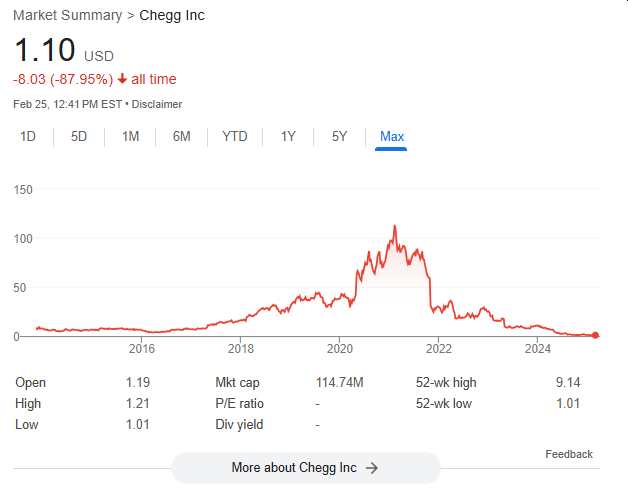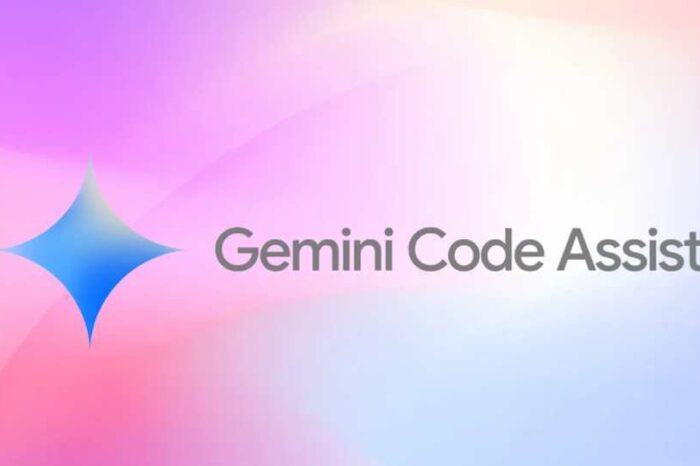Chegg sues Google, blames AI-generated summaries for traffic loss, falling revenue, and 90% stock crash

Chegg is taking Google to court, accusing the tech giant of unfair competition over its AI-generated search summaries. The online education company says Google’s AI Overviews have siphoned away traffic and revenue, leaving its business struggling.
The lawsuit, filed Monday in federal district court, argues that Google’s AI-generated summaries pull information from sources like Chegg without sending users to the original site. That, according to Chegg, has had a devastating effect on its business.
“The company, which offers online homework help, has also filed a lawsuit against the search engine and its parent Alphabet Inc. over what it says is unfair competition caused by the Google AI Overviews product,” Bloomberg reported.
According to Bloomberg, Chegg is considering major changes to its business model after traffic to its education platform collapsed following Google’s launch of AI-generated search summaries. The company says Google’s AI Overviews now provide direct answers to students, reducing the need for them to visit Chegg’s site at all.
“These two actions are connected, as we would not need to review strategic alternatives if Google hadn’t launched AI Overviews,” said CEO Nathan Schultz. “Traffic is being blocked from ever coming to Chegg because of Google’s AIO and their use of Chegg’s content to keep visitors on their own platform.”
Google’s AI-Generated Overviews Are Gutting Search-Driven Businesses
This is part of a larger problem affecting search-driven businesses. Google’s AI-generated summaries now provide direct answers at the top of search results, pulling information from various sources without necessarily sending traffic to them. Websites that depend on search visibility—whether education platforms, media outlets, or reference sites—are seeing a decline in visitors as Google’s AI keeps users on its own pages.
For Chegg, the impact has been severe. The company has lost about 90% of its market value since going public in 2013, and its stock fell another 24% after the lawsuit was announced, dipping just above $1 per share. Chegg has brought in Goldman Sachs to explore options, including a potential sale or going private, Schultz told analysts on a Monday earnings call.
Chegg reported a $6.1 million net loss on $143.5 million in revenue for the fourth quarter, a 24% decline from the previous year. While the numbers slightly exceeded analyst expectations, its forecast for the first quarter—between $114 million and $116 million—fell well short of the $138.1 million analysts had predicted.

Google’s Monopoly Under Fire
Schultz accused Google of forcing companies like Chegg to hand over proprietary content just to be included in search results. He argued that Google is profiting off Chegg’s content without driving traffic to it.
While Chegg is suing Google, it’s also investing in AI itself. The company has integrated AI models from Meta’s open-source Llama, as well as private players like Anthropic and Mistral. It also partners with OpenAI, which Schultz acknowledged as both a competitor and a collaborator. The company reported 3.6 million student subscriptions in the fourth quarter, a 21% drop from the previous year. Subscribers get access to AI-powered learning tools, along with Chegg’s textbook rental and sales business.
Google’s AI Overviews have been rolled out in more than 100 countries and reach over a billion users. These summaries appear at the top of search results, often before links to external sites, which critics argue funnels users away from original content creators and toward Google’s own ecosystem.
In response to the lawsuit, a Google spokesperson told CNBC that the company will fight back, claiming that AI Overviews actually send traffic to a wider variety of sources. “Every day, Google sends billions of clicks to sites across the web, and AI Overviews send traffic to a greater diversity of sites,” the spokesperson said, according to another report from CNBC.
Chegg’s lawsuit claims that Google tapped into its database of 135 million questions and answers to train its AI models. The company provided screenshots showing Google’s AI Overviews displaying information seemingly pulled from Chegg’s site without attribution, while Chegg’s original content appears lower in search rankings.
The lawsuit leans on a federal judge’s ruling from last August, which determined that Google holds a monopoly in the search market. That decision stemmed from a landmark 2020 antitrust case filed by the Department of Justice, arguing that Google created barriers to entry and reinforced its dominance through a self-sustaining feedback loop.
Chegg’s case is the latest in a wave of lawsuits against AI-driven content aggregation, a battle that could determine how search engines interact with publishers in the future. If Chegg wins, it could force Google to rethink how AI-generated summaries work—and whether businesses relying on organic search traffic can still survive.
Chegg’s revenue decline highlights a broader trend where AI is replacing businesses that offer services easily replicated by machine learning models. When AI can perform the same tasks faster, cheaper, and at scale, companies built on traditional models struggle to compete.
Founded in 2005, Chegg built its business around online tutoring and academic support, helping students with test prep and essay writing. The company’s subscription model, starting at $15.95 per month, has been a key revenue driver. But as AI chatbots like ChatGPT emerge as free alternatives, more students are turning away from paid services, putting Chegg’s business under pressure.




